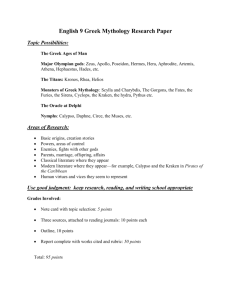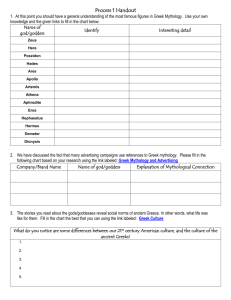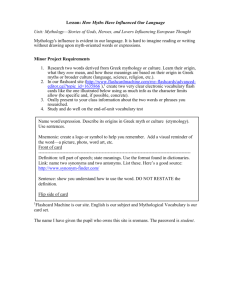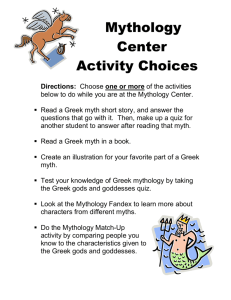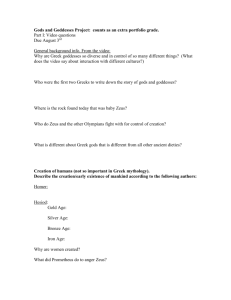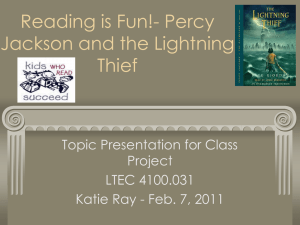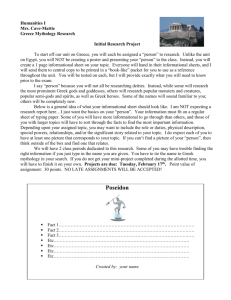The Lightning Thief - State Library of Louisiana
advertisement
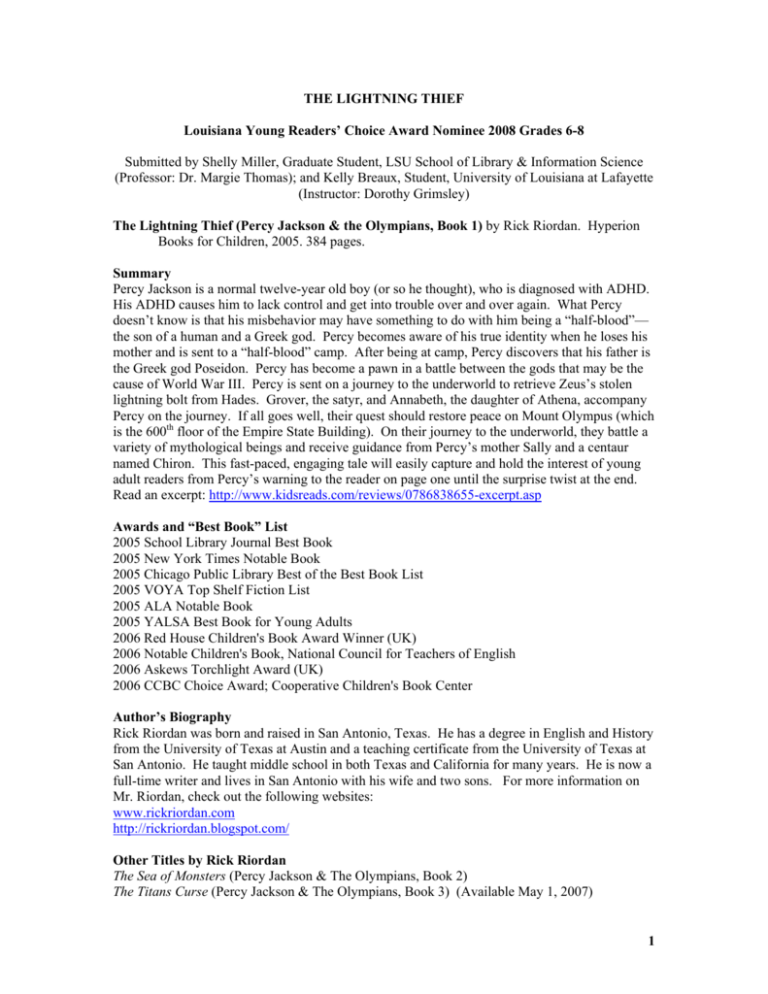
THE LIGHTNING THIEF Louisiana Young Readers’ Choice Award Nominee 2008 Grades 6-8 Submitted by Shelly Miller, Graduate Student, LSU School of Library & Information Science (Professor: Dr. Margie Thomas); and Kelly Breaux, Student, University of Louisiana at Lafayette (Instructor: Dorothy Grimsley) The Lightning Thief (Percy Jackson & the Olympians, Book 1) by Rick Riordan. Hyperion Books for Children, 2005. 384 pages. Summary Percy Jackson is a normal twelve-year old boy (or so he thought), who is diagnosed with ADHD. His ADHD causes him to lack control and get into trouble over and over again. What Percy doesn’t know is that his misbehavior may have something to do with him being a “half-blood”— the son of a human and a Greek god. Percy becomes aware of his true identity when he loses his mother and is sent to a “half-blood” camp. After being at camp, Percy discovers that his father is the Greek god Poseidon. Percy has become a pawn in a battle between the gods that may be the cause of World War III. Percy is sent on a journey to the underworld to retrieve Zeus’s stolen lightning bolt from Hades. Grover, the satyr, and Annabeth, the daughter of Athena, accompany Percy on the journey. If all goes well, their quest should restore peace on Mount Olympus (which is the 600th floor of the Empire State Building). On their journey to the underworld, they battle a variety of mythological beings and receive guidance from Percy’s mother Sally and a centaur named Chiron. This fast-paced, engaging tale will easily capture and hold the interest of young adult readers from Percy’s warning to the reader on page one until the surprise twist at the end. Read an excerpt: http://www.kidsreads.com/reviews/0786838655-excerpt.asp Awards and “Best Book” List 2005 School Library Journal Best Book 2005 New York Times Notable Book 2005 Chicago Public Library Best of the Best Book List 2005 VOYA Top Shelf Fiction List 2005 ALA Notable Book 2005 YALSA Best Book for Young Adults 2006 Red House Children's Book Award Winner (UK) 2006 Notable Children's Book, National Council for Teachers of English 2006 Askews Torchlight Award (UK) 2006 CCBC Choice Award; Cooperative Children's Book Center Author’s Biography Rick Riordan was born and raised in San Antonio, Texas. He has a degree in English and History from the University of Texas at Austin and a teaching certificate from the University of Texas at San Antonio. He taught middle school in both Texas and California for many years. He is now a full-time writer and lives in San Antonio with his wife and two sons. For more information on Mr. Riordan, check out the following websites: www.rickriordan.com http://rickriordan.blogspot.com/ Other Titles by Rick Riordan The Sea of Monsters (Percy Jackson & The Olympians, Book 2) The Titans Curse (Percy Jackson & The Olympians, Book 3) (Available May 1, 2007) 1 Related Titles Greek Mythology Anatopsis by Chris Abouzeid. Juliet Dove, Queen of Love: A Magic Shop Book by Bruce Coville. The Iliad by Nick McCarty. Greek Gods and Godesses by Geraldine McCaughrean. Pig Scrolls by Paul Shipton. Attention Deficit Disorder Joey Pigza Loses Control by Jack Gantos. Fantasy Shadows on the Stars (Great Tree of Avalon Series #2) by T.A. Barron. Peter and the Starcatchers by Dave Barry and Ridley Pearson. Haroun and the Sea of Stories by Salman Rushdie. The Chocolate Touch by Patrick Skene Catling. Classroom Connections RickRiordan.com http://www.rickriordan.com/ The author’s website is divided into two major categories, one area for fans of his young adult books, and the other for his fans of his adult literature. It includes a biography, information about his books; an interview; Percy Jackson’s Scrapbook; and a link to Greek Mythology. The Teacher’s Guide http://www.rickriordan.com/Teachers_Guide_Lightning_Thief.pdf features an in-depth lesson plan for the book The Lightning Thief. This novel offers a great springboard for the study of Greek Mythology. The following resource books will be helpful in planning lessons on this subject. • Nickerson, Charles. Greek Mythology: Cultures and Art. ArtsEdge Curricula, Lessons and Activities. Washington, D.C.: National Endowment for the Arts, 2002. Available through ERIC, ED476281. • Jaffe, Charlotte and Marilyn Lieberman. Odyssey Game: A Simulated Journey Through the World of Classic Greek Mythology. Lakeside, CA: Interactive Publishers, 1989. Although not prominent in the story, the value of recycling is a recurring theme in Lightning Thief. If a recycling program does not exists in your school, have your class organize such a program. Language Arts • Have the children read about the Greek Gods from the website: http://www.historyforkids.org/learn/greeks/religion/gods.htm Then tell the students to imagine that they are a Greek gods. Have the students write a paragraph including the following information: o What his/her name would be if they were a god. o What his/her name would mean (Ex: Hermes is the messenger of the gods). o What he/she would look like. o What powers he/she would have. 2 Art • Using the website below have the students learn about the four different types of Greek art: agriculture, sculpting, painting, and pottery. Using one of the four types of art, have the students make a Greek god or mythological creature. http://www.historyforkids.org/learn/greeks/art/greekart.htm Social Studies • Percy Jackson has Attention Deficit Hyperactivity Disorder. Have the class discuss ADHD. • Resource book: A.D.D. Not B.A.D. by Audrey Penn. Drama • Divide the students into groups of four to five students each. Have them pick their favorite scene from the story and act it out in front of the class. Geography • Have the students research Greece and do a presentation that includes facts and interesting information about the country. Resource: http://www.infoplease.com/ipa/A0107588.html Web Sites Nancy Keane’s Booktalks http://nancykeane.com/booktalks/riordan_lightning.htm This site contains a book talk about The Lighting Thief. ADHD Early Childhood Today “Working with Children with ADHD” http://content.scholastic.com/browse/article.jsp?id=3395 This article explains why children have difficulty paying attention. Mythology Greek Mythology Website http://techcenter.davidson.k12.nc.us/spring5/goddess2/index.htm This student-created website includes information about the history, geography, and creatures of Greek mythology. Winged Sandals Produced by the Australia Broadcasting Corporation with the University of Melbourne http://www.wingedsandals.com/ This site includes games, stories, project ideas, and brief historical overviews on a variety of topics related to Greek culture and mythology. It Came from Greek Mythology http://edsitement.neh.gov/view_lesson_plan.asp?id=234 3 This National Endowment for the Humanities education site explores the origins of Greek mythology and the impact these stories have on our culture today. It includes of lesson plans and resources for educators. 4
